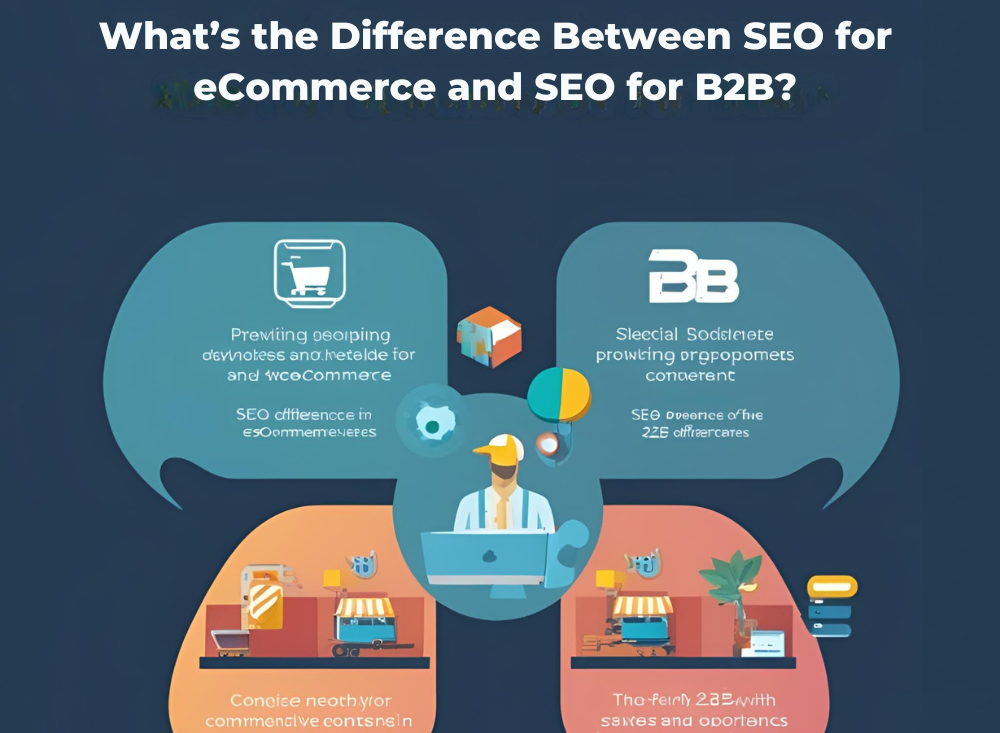
Earch engine Optimization (SEO) is essential for every business looking to drive organic traffic, generate leads, and boost revenue. However, SEO for eCommerce and SEO for B2B (Business-to-Business) are not the same. Each requires a different approach, mindset, and strategy because the target audiences, buying journeys, and conversion goals vary significantly.
If you want to maximize results, understanding the key differences between eCommerce SEO and B2B SEO is crucial.
In this article, we’ll break down the differences and share tips to tailor your SEO strategy based on your business model.
Understanding the Basics
Before diving into the differences, let’s clarify what each type of SEO typically focuses on:
- eCommerce SEO:
The goal is to drive traffic directly to product pages and category pages to generate immediate online purchases. Speed, user experience, and seamless checkout processes are critical. - B2B SEO:
The goal is to generate qualified leads by driving traffic to informative content, service pages, or landing pages. The purchase decision is usually longer and involves multiple stakeholders.
Key Differences Between eCommerce SEO and B2B SEO
1. Target Audience and Buyer Journey
✅ eCommerce SEO:
- Audience: Individual consumers (B2C model).
- Journey: Often impulsive or based on need; can range from minutes to a few days.
- Goal: Encourage a quick purchase with persuasive product descriptions, reviews, and price comparisons.
✅ B2B SEO:
- Audience: Business decision-makers (executives, managers, procurement teams).
- Journey: Research-heavy, longer buying cycles (weeks to months).
- Goal: Build trust through educational content, case studies, whitepapers, and thought leadership.
? Summary: eCommerce SEO pushes for a quick conversion, while B2B SEO nurtures a longer relationship.
2. Keyword Strategy
✅ eCommerce SEO:
- Focus on product-focused keywords and transactional intent.
- Examples: “buy wireless headphones,” “best running shoes for women,” “cheap laptops under $500.”
✅ B2B SEO:
- Focus on informational and solution-focused keywords.
- Examples: “best CRM for startups,” “how to choose a cloud hosting provider,” “B2B lead generation strategies.”
? Summary:
eCommerce keywords aim for immediate sales, while B2B keywords aim to educate and qualify leads.
3. Content Strategy
✅ eCommerce SEO:
- Prioritize product descriptions, category page content, reviews, and shopping guides.
- Content often highlights features, pricing, and promotions.
✅ B2B SEO:
- Prioritize blogs, whitepapers, case studies, webinars, and solution pages.
- Content is educational and aims to solve problems or inform purchasing decisions.
? Summary:
eCommerce content is transactional and feature-driven; B2B content is educational and value-driven.
4. Site Structure and User Experience
✅ eCommerce SEO:
- Emphasis on clear navigation, faceted search, filters, and fast checkout.
- Large sites with hundreds or thousands of product pages require scalable site architecture and robust internal linking.
✅ B2B SEO:
- Focus on easy access to resources (case studies, whitepapers), clear CTAs for lead capture (demo requests, consultations).
- Simpler site structures, but deeper content paths (pillar pages, knowledge hubs).
? Summary:
eCommerce UX drives ease of purchase, while B2B UX nurtures relationship-building and information discovery.
5. Conversion Goals
✅ eCommerce SEO:
- Primary goal: Immediate online purchase.
- KPIs: Add-to-cart rate, checkout completion rate, average order value.
✅ B2B SEO:
- Primary goal: Lead generation.
- KPIs: Form submissions, demo requests, downloads, qualified lead volume.
? Summary:
In eCommerce, success is purchases; in B2B, success is conversations and qualified leads.
6. Link Building Strategy
✅ eCommerce SEO:
- Product-focused backlinks from review sites, influencers, deal sites, and niche blogs.
- Focus on promoting specific products or categories.
✅ B2B SEO:
- Authority-building backlinks from industry publications, research papers, professional associations, and business blogs.
- Focus on promoting thought leadership and expertise.
? Summary:
eCommerce link building is often product-driven, while B2B link building is reputation-driven.
7. Technical SEO Focus
✅ eCommerce SEO:
- Handling duplicate content from product variations.
- Canonical tags, structured data (schema) for products.
- Optimizing for mobile commerce and site speed under heavy catalog loads.
✅ B2B SEO:
- Ensuring indexation of deep resource pages.
- Implementing schema markup for FAQs, events, and organizations.
- Technical focus often supports long-form content.
? Summary:
eCommerce faces technical challenges with large inventories, while B2B emphasizes content accessibility and information architecture.
Final Thoughts
While eCommerce SEO and B2B SEO share common ground in fundamental SEO best practices (like keyword optimization, site speed, and mobile responsiveness), their strategies must be distinctly tailored to their audiences and business goals.
✅ If you’re selling products online, focus on transactional intent, scalable site structures, and persuasive product content.
✅ If you’re targeting businesses, prioritize educational content, lead generation optimization, and long-term relationship building.
Ultimately, the key to successful SEO lies in understanding your customer journey — and optimizing every step of the way.